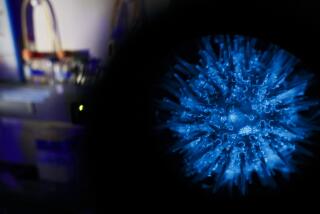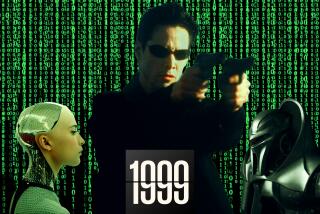Meaning of life is thorny question
WASHINGTON â Philosophers wrestling with the big questions of life are no longer alone. Now scientists are struggling to define life as they manipulate it, look for it on other planets, and even create it in test tubes.
In June, researchers replaced the genetic identity of one bacterium with that of a second microbe. Other scientists are trying to build life from scratch. NASA scientists are searching for life in space but arenât sure what it will look like. And some futurists are pondering the prospect of robots becoming so human that they might be considered a form of life.
So as scientists push the bounds of biology, astronomy and robotics, a big question looms: What exactly is life?
That question is bubbling up from recent advances in lab work.
In suburban Washington this summer, prominent scientists at the J. Craig Venter Institute, who were key players in mapping the human genome, switched DNA from one bacterium into another, changing its genetic identity. That put the world on notice that manâs ability to manipulate life is dancing around the point of creation.
Now Venter is asking for a patent for a completely new bacteria that would be created by inserting genes into a hollowed-out cell of what once was a urinary tract bug. Venter doesnât view that as creating life, just âmodifying life to come up with new life forms.â
At least half a dozen other research teams worldwide are going further, trying to create life out of chemicals, mimicking the beginnings of life on Earth. Theyâre somewhere from three to 10 years from success, they figure.
For them, and Venter, newly created life forms mean new energy sources, environmental clean-up mechanisms and life-saving medicines. For others, such a breakthrough would mean understanding how life began on Earth by trying to recreate it.
âWeâre all sort of thinking that the next origin of life will be in somebodyâs lab,â said David W. Deamer, a UC Santa Cruz biochemistry professor who is one of the leading experts trying to create life. But ask Deamer what life is, and he responds by saying itâs best to describe it, not define it.
Broadly put, scientists like Deamer say life requires a cell with genetic material and the ability to reproduce, turn food into energy, and evolve through natural selection. But itâs not that simple for others seeking a definition.
At NASAâs Astrobiology Institute in California, which studies extreme life here and the possibility of it elsewhere, itâs far easier to say what life isnât, said institute Director Carl Pilcher.
âRight now we may not have the base of knowledge necessary to answer the question, but there are ways we are proceeding,â he said.
In July, the National Academy of Sciences issued a âweird lifeâ report cautioning NASA not to be so focused on water. It told the space agency that âas the search for life in the solar system expands, it is important to know what exactly to search for.â
That same report urged NASA to avoid being âfixated on carbonâ when it looks for life even though carbon is often called the backbone of life on Earth.
But if carbon isnât a requirement for life, how about silicon? In other words, what about machines?
Ray Kurzweil, a renowned futurist who advises people like Bill Gates, believes that by 2029 a machine will pass a prime test of artificial intelligence, offering the same kind of answers as a human.
âThe key issue as to whether or not a non-biological entity deserves rights really comes down to whether or not itâs conscious,â Kurzweil said. âDoes it have feelings?â
This isnât just a Kurzweil concept.
âA monumental shift could occur if robots continue to be developed to the point where they can at some point reproduce, improve themselves or if they gain artificial intelligence,â said a 2006 study commissioned by the British governmentâs science office. That report compared the situation of robots to the emancipation of slaves.
Many scientists familiar with these challenges of defining life say the answers wonât be easy to find.
âItâs an important but ultimately frustrating question if one expects to come up with a nice clean shiny answer; it ainât going to happen,â said Dr. Francis S. Collins, a prominent Christian scientist and director of the National Human Genome Research Institute.
That talk about life is going to get uncomfortable as dreams of creation, from Frankensteinâs monster on, get closer to reality, said University of Pennsylvania bioethicist Art Caplan.
âThis issue of âwhat is lifeâ has been at the core of biology for about 400 years,â Caplan said. He said it had led to the more theological questions about whether life was special and whether humans were special.
Later this century, the definition of life will be at the heart of a political and societal debate as heated and divisive as abortion and embryonic stem cell research, Caplan predicts.
Look for changes in religion too.
âAs knowledge has [been] added, religions have adapted,â Venter said. âI donât see why this is any different. Weâre pushing the frontiers of knowledge, understanding life on this planet.â
Venter dismisses suggestions that scientists are playing God as media sensationalism. And Collins, a scientist who talks at length about his faith, said he found it interesting that the people who most often use the phrase âplaying Godâ usually didnât believe in God.
âPlaying Godâ is a secular, not religious, term, said Ted Peters, a professor at the Graduate Theological Union in Berkeley, Calif., and author of the book âPlaying God.â He said people who worried about that were really talking about tinkering with nature.
âWhat Craig Venter is doing is an extremely complicated form of animal breeding,â Peters said. âWeâre going to be changing the face of the planet no matter what. The question is, do we want to do it responsibly or not?â
C. Ben Mitchell, a bioethicist connected with Trinity University, an evangelical Christian college in Illinois, worries about entrusting such monumental developments with scientists.
âHuman history is enough; it is sufficient to remind us of the problem of hubris,â Mitchell said. âIt is at least a cautionary note, to caution us to be aware of unintended consequences.â
One of the men trying to make life from scratch, Mark Bedau, understands the worries. A philosophy professor from Reed College in Oregon, Bedau is also the chief operating officer of the synthetic biology firm ProtoLife in Venice, Italy.
His team and others are trying to make single-cell organisms from chemical components, creating a genetic system that multiplies and a metabolism that takes in energy from the environment. Scientists say they are close to completing a key first step, creation of a vesicle, or container, for the cell.
âWe are doing things which were thought to be the province, in some quarters, of God -- like making new forms of life,â Bedau said in a phone interview from Venice. âLife is very powerful, and if we can get it to do what we want . . . there are all kinds of good things that can be done.
âPlaying God is a good thing to do as long as youâre doing it responsibly,â he said.






